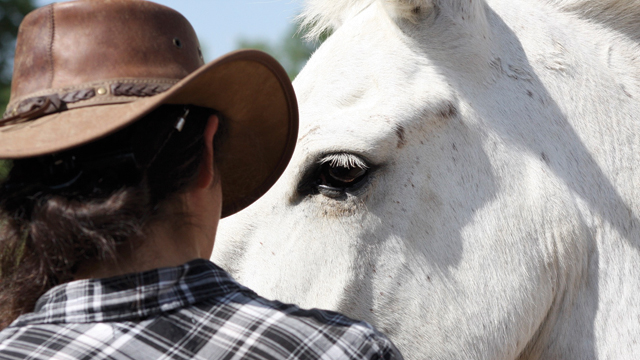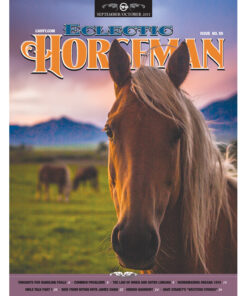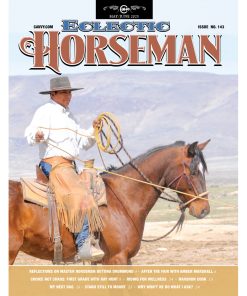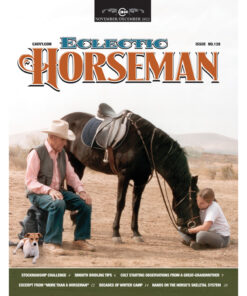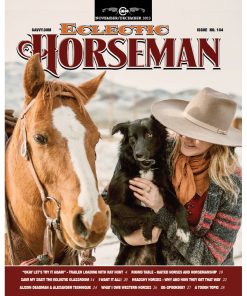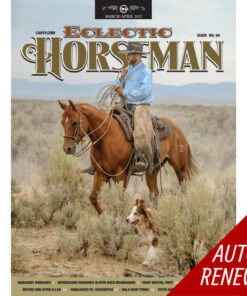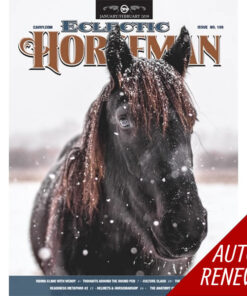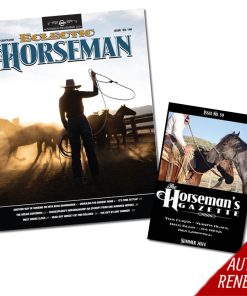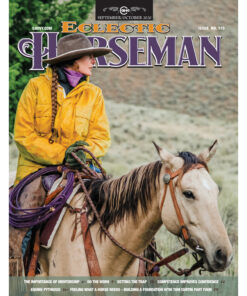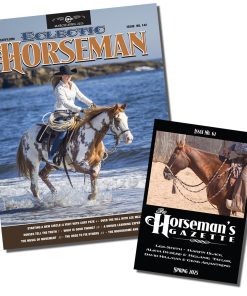This article originally appeared in Issue No.107
“This is why we call it the Uh Oh ranch!” I heard Mindy say with a laugh. I could appreciate the irony as my colt gave one last buck before deciding it was easier just to move forward off my legs.
I still laugh thinking about it. Likely most any novice rider could ride the few bucks of protest that had come when I asked for a trot. But I classified myself as “greener than green,” a term I didn’t fully realize the accuracy of until my first days at the ranch. Day one I was put on one of the most solid horses there —a 19-year-old named Jack—and about came off when he took a simple turn at a trot in the arena. Next was Clifford the roan draft horse. If he so much as tripped, I fixed to fly between his ears and just barely kept my balance by pushing on the back of the saddle horn.
If Mindy was concerned by the soft-spoken greenie who landed on her doorstep, she did a marvelous job not showing it. Instead she took every opportunity to work on both the “soft spoken” and the “greenie” portions, as well as identifying and challenging other areas where I needed to grow.
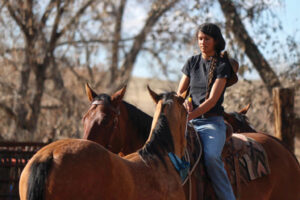
Serious doubts set in just a few hours into that first morning at Uh Oh ranch. I wondered more than a hundred times that day how on earth I got the scholarship. I felt like a ridiculously slow learner and though I hate to admit it, it was very challenging for me to adjust to the new “classroom” and my new teacher. Most of the time I felt overwhelmed. It isn’t hard to be intimidated by Mindy Bower. Mindy is a skilled, hands-on instructor who does not waste words. Safety and the betterment of all parties involved are her top priorities. She aims to instill “awareness” and “common sense” and emphasizes these concepts constantly as she instructs. I laugh while writing this because in many ways I could also be describing my parents, who spent 18 years educating me and my siblings at home. I imagine after years of rehashing these same ideas, they may be relieved to have outside help reinforcing the lessons they strove so hard to instill.
I constantly wondered whether I would make it through to the end of my stay. When I applied for the scholarship, I had wondered how many times one was allowed to apply. It never occurred to me I would get in the first time. So, I struggled with feeling that it was all an unfortunate mistake for everyone involved that I was now a scholarship recipient. I was sure Mindy saw the error the committee had made, and even if she graciously tolerated it for a while, would eventually tell me that I was in the wrong place at the wrong time and that I was far from ready to be there.
How wrong I was!
My pride was feeding my fear of being vulnerable with my own inexperience. I had to recognize that no one is ever “too much of a beginner” to learn.
Fortunately for me, Mindy Bower doesn’t give her students much time to think about insecurities. Dare I say she doesn’t give you much time to think about anything except the task at hand. That is a beautiful thing! Living in the moment is something that modern society has lost. I’m the worst at being so caught up in a million fears and worries and plans and thoughts that have everything to do with anything but the present. If that last sentence was confusing and stretched…well, that’s kind of my point. My mind gets as scattered as the tenses I try to live in and I lose sight of the importance of keeping myself in the present. Yet that is how animals operate. So how could I expect to gain even the slightest ground if I’m unable to stay with them in the moment?
Mythril (my rescue mule) certainly agreed, if I couldn’t even keep up with him mentally there was no way I was trustworthy enough to keep up with him period. Could I blame him?
About halfway into the first week I bribed Mythril over to the arena (bribing being an intricate process of using Gimli—my formerly Amish mule—and food and very timid body language to try to give some sort of direction to his trajectory once leaving the enclosure). If Mindy was already skeptical about me then, I figured once Mythril came into the picture it’d be the proverbial “nail in the coffin.”
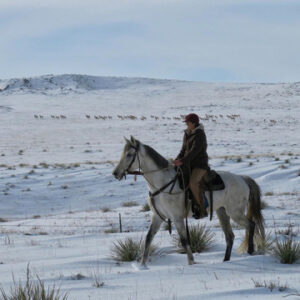
Once in the arena we lasted perhaps thirty seconds before he got tight and pulled away. Thanks to Audrey’s help early on in my journey, he was slightly easier to catch and more reasonable in general than when I first got him. That itself is a testament to how deep the waters were that I’d gotten myself into when acquiring these two mules. I glanced over despite the rising heat on my face, but couldn’t read Mindy. She just motioned for me to hand her the lead rope once I’d caught him for the third time in the last five minutes.
“He’s a pro,” Mindy said with a wry grin, as despite much more assertive efforts at keeping him with her, he pulled away from her too and trotted with his head held high to the far end of the arena. I didn’t feel like grinning, even slightly. If he could pull away from Mindy Bower, then it must be hopeless. I wish I could say I wasn’t this self-absorbed, but unfortunately all my insecurities just led me down the rabbit hole of feeling completely out of place and very out of sorts. I had been focused on fixing Mythril. I was going to fix him, miracle or no miracle. And yet now, the idea of ever “fixing” him now seemed as absurd as my presence on the ranch in the first place.
I had overlooked a very important fact, the fact that I might be the one who needed fixing.
It was more than my skill (or lack thereof) when it came to horsemanship, that needed work. I eventually came to realize that the root of my behavior was my own selfishness and pride. While I thought I was being humble and realistic, I was actually being self-focused and letting my fears get the best of me. Selfishness dampened my awareness and kept me from seeing beyond myself and recognizing the needs around me, especially the needs of Mythril. My pride kept me focused on what others thought of me and prevented me from giving myself fully to anyone or any situation. It was inhibiting my ability to live vulnerably in the moment and thwarting my ability to learn and grow. I had to recognize these unhealthy patterns and change. The first was almost simple to do—the second not quite as easy, but absolutely necessary.
Those were my problems when arriving at Uh Oh Ranch. And coming to that realization ultimately confirmed for me that I was exactly where I was supposed to be. I had to get past my convoluted perspective as a first step toward dealing with the heart of the issue—my mindset needed to change.
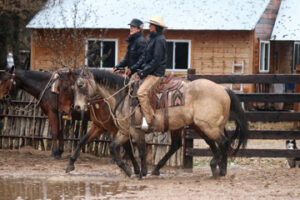
Bit by bit, and day by day, I recognized that my initial perspective and the things that challenged me when working with Mindy had mostly to do with these weaknesses and my need for maturing. After days of speculating if I would survive the feelings of intimidation, frustration and helplessness, I realized that if I didn’t toughen up and change quickly, I would miss the opportunity of a lifetime. Though relatively young at age 19, perhaps I had bought into the notion that change takes a long time. I didn’t have a long time. My parents told me many times over the years that we can never change anyone else. We can only change ourselves. I was finally understanding. Change, at least in myself, could be as instantaneous as I wanted it to be. And it had to start in my heart and mind.
As my perspective changed, so too did my appreciation for the new environment and Mindy’s very direct and pointed approach. She was shaping not only my horsemanship but my character as well. The time when Mythril first pulled away from Mindy (it wasn’t to be the last for either of us) seemed an omen of the end of my horsemanship journey. Now as I look back, I see it was simply another beginning.
We got Mythril back to the round pen and I received some lessons in roping. I spent the largest portion of that time missing whatever I was aiming for, but what a mixed feeling of relief and satisfaction when my loop finally caught! Then we worked on everything we could from the ground, setting it up so that I could “help him leave” when Mythril thought about leaving, and encourage him to stay when he chose to. In the smaller confines of the round pen I had a better chance of “getting with him” more quickly. We did a lot of catching him and then turning him loose. Then there was lots of saddling and bridling prep, working with the flag—helping us both to gain confidence in a variety of areas. Mindy set me up with a lead rope that was long enough to keep ahold of him from anywhere in the round pen; this helped him learn that leaving wasn’t always the answer. When doing the groundwork, as he would go to leave, Mindy would coach me to time up with his feet: letting him move away and then bracing across my hips and giving a firm bump so that he would hit the end of the lead rope. She emphasized to me how critical it was to not let him find out how much I actually weigh. As long as I would use a bump or anchor myself to let him hit the end of the lead rope without applying steady and constant pressure, I could be fairly effective if he didn’t figure out that he could still pull me around just like before.
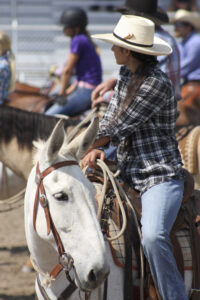
We worked on this from the ground for the first week. I would catch or, if I could, rope him out of his pen and lead him through the corrals to the round pen. There I’d work on all the basic groundwork and if it went well, would build on it. Sometimes I’d take him to the arena with everyone else and try to work him there, using the smaller pen at the back of the arena to work from square one again if I was having trouble. This trouble spot would persist, but we could layer a lot of good experience where he was able to find peace staying with a human. Then, hopefully, he’d start searching for peace with me before searching for it somewhere else (e.g. at the other end of the arena.)
After observing and working with us both, Mindy decided the best place for me to continue working with him would probably be on his back. I remembered how light and easy he had felt to me when I first rode him just before we bought him. I was curious after riding some of Mindy’s other truly light horses, how he would feel to me now. It had, after all, been two years since the last time I’d ridden him.
He got really tight as soon as I got on but moved off quietly, if somewhat braced, when I asked. I picked up one rein and he turned as light as a feather…and as stiff as a board. While he was responsive it was just shy of reactive, complying out of worry more than anything. It was as if there was something simmering under the surface but stayed trapped there like a pressure cooker.
I didn’t really register all of this at the time. What I did sense, I could hardly have put into words. Mainly I was just ecstatic to finally be on him again.
I rode him around rather aimlessly for a few minutes at which point Mindy told me to support him by giving him more direction: “He’s going to forget you are up there if you don’t get busy,” she cautioned. I walked some figure-eights around the tires which highlighted a particular brace he had on the left side. He would lean when I picked up on that rein and it was a challenge to get to his hindquarters. When the steering improved slightly Mindy suggested I ask for a trot. As soon as I closed my legs he got really tight, but didn’t respond right away. When I asked with a little more pressure he broke into a trot, but I lost him mentally and the mutual feeling between us quickly turned to panic. He sought support and I was too nervous to think about doing anything but holding on. He didn’t do anything silly except to trot off as if he were pulling away, but this time I was on his back and with me getting tight and compromising my balance, he got increasingly worried and everything just escalated. Mindy called out to bend him and once I finally got the nerve to let go of the saddle horn and shorten up on one rein, we eventually wound down to a stop.
We went back to steering at the walk. Mindy did for me what I was failing to do for Mythril—she supported and directed me, and in turn helped me be available to do the same for him. I so value step-by-step, minutely specific direction and it came as a shock to me that I didn’t even consider that the equine would be seeking something similar from me. Not only had it not even occurred to me how much more I need to be there for them, I wasn’t terribly good at it either! When we ran into trouble I’d be more likely to get them deeper in it because of my own reactions or poor riding skills than help them work through it.
Things simmered down after that little jaunt and when I put him back in his pen we both felt more confident and peaceful. It was such a small step, but in the long run it was still an important lesson, for me especially.
The next couple of weeks were fairly busy at the ranch, riding most of the day with Mindy, Amanda, another scholarship recipient and Kinsee, a working student who had been in Reata’s colt starting class the last semester at MSU. Much of my learning came as the result of making mistakes and subsequently learning how to both avoid them in the future and instead make different ones.
I was now able to ride Mythril almost daily, though he would still pull away at least once nearly every time we did groundwork. It increasingly felt he was using it as an excuse rather than due to actual fear, since we were both gaining confidence in each other. Ray, a builder who had been working at a job site next door to the ranch for the last two years, had been hanging around the arena during his breaks. Mindy enlisted his help to get us over the next speed bump.
The goal was to carry over the progress we’d made from the round pen to the arena, where it was harder to back ourselves up in helping Mythril to stay. Consistency was critical at this step. Since the lead rope was about 20 feet long, it bought us some time when he went to leave. We still couldn’t keep ahold of him the whole time like we could in the round pen. Mindy was very creative. There was enough rope for her to hold the portion closest to Mythril and do groundwork while Ray held the rest. As soon as Mythril went to pull away, Mindy dropped her part of the lead rope and Ray leaned back and anchored himself on his end. We jokingly called it sand skiing. Since the footing was sandy, Ray was able to stay on his feet and skid along with him, but the length of the rope kept him a safe distance away from Mythril’s hind feet. This was a big surprise to Mythril as the pressure didn’t let off but actually came with him. After traveling about ten yards he spun around and stopped. Then they started the process all over and repeated as many times as necessary.
Ray helped all that evening. The next day it was my turn. Without the foundation that had been laid, this scheme may not have succeeded. At this point Mythril was learning that leaving would mean more work. With a weight dragging along behind him, he simply didn’t get the release he was expecting. After a few more days of this sand skiing, Mythril turned a corner.
To help with the annual branding, the Dickenson family drove up from Okalahoma and spent a week. Between brandings, Aaron Dickenson spent an evening working with Mythril and me. He added a whole different dimension to how we were approaching things. His advice was to let go of Mythril if I couldn’t keep ahold of him, and help him to leave faster simply by dropping the lead rope before he could feel himself hitting the end of it. He suggested doing this for a while in the round pen first where I could back myself up before moving to a larger enclosure. He also spent a lot of time working with Mythril trying to lead him without anything on, just by using his hands on Mythril’s face. If Mythril gave to the pressure of his hands, then he rewarded it by releasing; if he resisted and left, Aaron helped him to go. By the end of the evening, you could lead Mythril all over the round pen with just a hand under his jaw. After the Dickensons left, I tried to see just how much I could do without a halter: saddling, drawing and driving, handling his feet, working on lateral flexion, getting to the hindquarters. It really helped to look at things differently and to have fun experimenting.
The combination of all these things led to a big mental change in both of us. I stopped seeing Mythril’s leaving as such a big deal. He stopped making a big deal of it. While he’d still test me regularly, it felt half-hearted compared to what it had been. Before I knew it almost three months had passed and I struggled to recall the last time he’d gotten away from me.
It was August now and Mythril had become somewhat of an odd steady-Eddie: he was generally nonplussed no matter what the situation or stimulator, but would randomly run off with you if he wasn’t interested in what you had asked of him. For example, I could ride him right through Mindy’s sheep without hesitation, whereas my other mule Gimli and most of the horses would understandably become anxious. But if I asked for him to turn right when he wanted to turn left, he’d simply flatten out and leave. I’d stay on him, but he’d be checked out mentally and generally aimed for another horse and rider or some other frustrating destination, like under a low-hanging cottonwood tree. Though improving, he was still somewhat predictably unreliable.
A week before the Buck clinic, Mindy and I went out for a quick ride on one of the back pastures. Cottonwoods are scattered more thickly near the creek bed and there are several trees lying around that had come down years prior. It is a fun place to ride with lots of opportunity to use the trees to guide your horse around and over. Mindy was on Luna—a colt that she had let me help her start (it was a big first for me)—and I was on Mythril. We reminisced over the past few months, laughing as we recalled the amusing trio the mules and I were when we showed up with all of our challenges.
“Mythril would make a good jumper. You should have seen how he loved to jump our brush pile every time he pulled away from me back home,” I jested.
“Have you ever jumped him?”
“No, but if you don’t think it’s an insane idea, I’d love to have your help getting him to the point one day where I could casually jump him. Just for fun, not to compete, but I think it’d be neat. I’m probably crazy though. He’s already come so far.”
Mindy didn’t miss a beat. “Go try that log up ahead. The longer one. Just aim for the middle and hold his mane so you don’t pull on his mouth.”
I thought she was kidding.
“Oh, um, I meant in the future once you think he’s ready.”
She nodded. “Go try that log.”
I wished she was kidding.
We walked over with great uncertainty and I asked him to go over it. He wasn’t convinced either and stepped over it hesitantly.
“You’ll have to actually ask him to go,” Mindy teased.
I turned around and trotted toward it and this time he jumped. I lost my balance some because I was behind the motion and not organized. He grabbed himself and got tight for a moment due to my poor riding. I stayed on, but it was all around sloppy on my part. He just stopped on the other side and waited, probably half expecting he’d get in trouble for doing something he wasn’t supposed to. I was thrilled. Feeling more confident, I tried another, and for the next several minutes Mindy and I rode around finding different hurdles to try. I’m sure it wasn’t the prettiest jumping you’ve ever seen, but we were sure having fun.
We returned to the arena with both us and our mounts in good spirits. One of Mindy’s students had arrived for lessons and we were all sitting on our horses chatting when Mythril started acting like he wanted to lie down. I moved him around a little but Mindy noticed and stopped me. “It’s different in each situation, but with him right now I’d let him lie down with you on him if you are comfortable with it.” I nodded and let him stop. He relaxed and took a deep breath, then adjusted himself and lay down.
I sat really still, making sure my feet stayed out from under him, and rubbed his neck. He sat there for a few seconds then got back up and took another deep breath. It was a huge and very tangible change from the Mythril I was used to. I got off, feeling deeply pleased and so humbled.
The Buck clinic was that weekend. The day before I still didn’t know which mule I would take. I wanted to take Mythril, but didn’t want to set ourselves up for trouble being in a different environment where it’d be especially harder to back myself up if he decided to leave. After talking with Mindy about it, she not only thought it was feasible to take him, but recommended that I do. I was starting to learn to expect the unexpected from her.
The Dickensons and some of their friends had come that week for the clinic and brought their horses. We had three trailers and nearly two dozen horses that we ended up taking, some of them for Mindy’s students who were going to meet us at the clinic. I can’t remember exactly why, but I didn’t have the halter with the 20-foot lead rope with me. I only had the regular one I used to tie Mythril in the trailer. I don’t know who was more nervous. It was the first time since we owned him that Mythril was trailered to a new location without Gimli. Any hopes of me being inconspicuous or keeping a low profile quickly went out the window. Though Mythril was very respectful on the end of the lead rope and didn’t show signs of leaving, every few minutes or so he let out a great big bray and looked around anxiously. I was hoping he’d quiet down by the time Buck rode in and we actually started, but alas, he continued at regular intervals to alert everyone to his presence. So not only the long ears, but the constant braying made it clear to everyone that a mule was in their midst. To my utter mortification, he even did it several times over Buck’s explanations. As hard as it was, I had to let it slide, stomp out my self-consciousness and pride yet again and get busy learning just as if I were back at the ranch.
Two hours later, I felt as if I was walking on air. I had just put up Mythril and was grabbing a snack as we waited for the Horsemanship Two class to start. He had been golden and I was indebted to Mindy for preparing us to reach this point. Riding in the Buck clinic was amazing, but it wouldn’t have been possible without Mindy’s intense involvement the months prior. She did exactly what she does for the horses—set us both up for success so we could continue to make progress.
The second day we ran into what in the past would have been a significant hitch, but that day was confirmation that we were getting somewhere. As we were walking through the arena to pick up my name tag, speakers turned on with a loud popping noise just as we were passing. I didn’t have time to jump (it startled me as well) before Mythril shot backwards and twisted his head away, wide-eyed and very much set up to leave. I had little time to react, but I moved to try to get a better angle when he stopped, looked at me, and then resumed walking forward. I didn’t know whether to be relieved or tickled; I was both I suppose.
At the end of the third day I walked over to thank Buck with my friend and roommate Mandy, who had flown over from Holland to also stay at the ranch. He was very kind and warm despite likely being very tired and having already heard different expressions of gratitude dozens of times from other riders. It was all still somewhat surreal to me. I was brimming over with gratitude to everyone who had been a part of this journey. I remember Buck telling me at some point during the brief conversation: “That mule can stop. Make sure you get a good stop on him.” Though I didn’t fully understand or appreciate what he was saying at the time, I was grateful for that advice and made a mental note to work on it.
As I watched the afternoon class finish up, I thought more about the process that had led to this point. Mindy’s approach could loosely be compared to throwing a toddler into the deep end of the pool to teach them to swim. I liken Buck’s approach more to the bulleted checklist of how to prepare for your first swimming lesson followed by a step-by-step walkthrough of just that lesson. I tended to think I worked better with the checklist and detail-oriented instruction. I have certainly been more inclined toward that approach all my life probably because it feels safer to me since I can regulate my progress to be as gradual and comfortable as I can handle. I can wade into the water on my own, so to speak. Now I realize that it was critical that I was “thrown in the water” first. It was crazy scary at points – struggling to keep my head above water and not sinking in resignation – but I had learned that just like with the horses, often the ideal place for learning lies just outside my comfort zone.
Mandy and I were still talking about that clinic long after it was over. I was gushy as usual talking about how amazed I was with Mythril—how he had done so marvelously and made so much progress—how I could hardly believe how far he’d come based on where he’d been when we started out. At one point, Mandy stopped me and said, “You know, you’ve got to stop focusing on his past as if he’s the same mule he was two years ago, or even two months ago. He doesn’t think the same way we tend to about past baggage and progress. He just changed. He’s moved on. At some point you have to, too, if you are going to really get somewhere together.”
I was very inclined to be defensive at first—after all, I wasn’t holding it over him like some dark cloud, but rather as a wonderful comparison to show his progress.
But Mandy was right. And her wise words helped me turn a corner. He had changed. And more importantly, he had moved on. By constantly remembering and talking about what he used to be, I was limiting what he could become. I was shortchanging him. He didn’t need the same old Cosette who tiptoed around him with my own self-imposed idea of feel and support. He needed me to meet him where he was now – in the moment. This truly was no longer about fixing him. It was about continuing to fix me. And about us taking the journey together—each changing ourselves.
The irony was that this all went back to how I eventually hoped to use the God-given chemistry between humans and horses, especially broken ones, to heal both.

